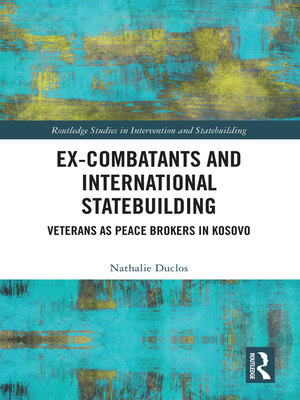Ex-Combatants and International Statebuilding
ebook ∣ Veterans as Peace Brokers in Kosovo · Routledge Studies in Intervention and Statebuilding
By Nathalie Duclos

Sign up to save your library
With an OverDrive account, you can save your favorite libraries for at-a-glance information about availability. Find out more about OverDrive accounts.
Find this title in Libby, the library reading app by OverDrive.



Search for a digital library with this title
Title found at these libraries:
| Library Name | Distance |
|---|---|
| Loading... |
This book examines the international efforts to regulate violence in Kosovo since 1999 through the United Nations Mission in Kosovo (UNMIK) and covers 15 years of international presence.
The book analyses the process of implementing international policies from a sociological perspective, and looks at the adaptations and arrangements of public policies achieved through the transactions of international actors with local actors, who are at the heart of policy implementation. In particular, it analyses the disarmament, demobilisation, and reintegration of combatants (DDR) programme and shows the extent to which it was co-produced with Kosovo Liberation Army (KLA) leaders co-opted by international administrators. These analyses take the opposite view to the work that considers ex-combatants as spoilers. In Kosovo, the combatant leaders acted as peace brokers, facilitating demobilisation and exercising disciplinary control over rank-and-file combatants. Their position as brokers helped them to take control of the new state being built under international administration. This book shows the importance of the relationship between ex-combatants and the state and illustrates the multiplicity of their possible trajectories, including political ones. To elucidate the dynamics of co-production in shaping DDR policies and hybridising international policies as well as in state formation, the book relies on around a hundred interviews with ex-combatants of the KLA and with international personnel, as well as on the archives of international organisations and observations in the field.
This book will be of much interest to students of international statebuilding, peace and conflict studies, Balkan politics and international relations.







